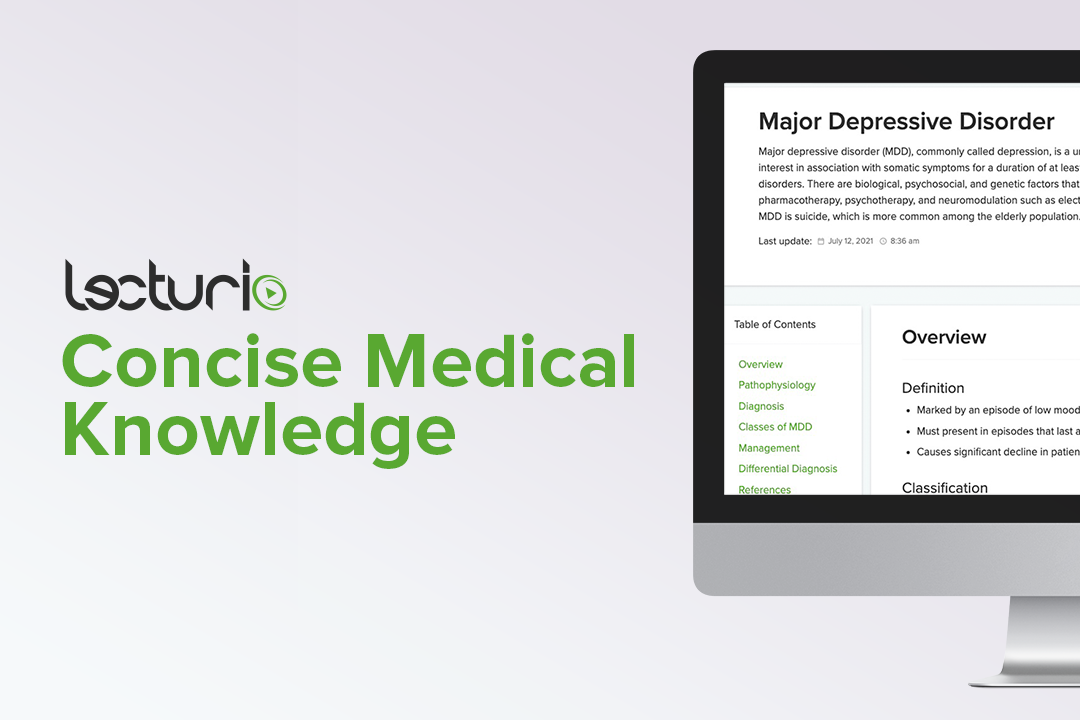Playlist
Show Playlist
Hide Playlist
Major Depression: Treatment
-
Slides Antidepressants Psychiatry.pdf
-
Download Lecture Overview
00:01 Now treating major depression, because of their tolerability and safety, SSRIs are actually the most common agents used, probably second to them are the atypical antidepressants. 00:14 Your treatment choice should be based on the patient's symptoms, their risk for suicide, previous response to medication, side effects and also comorbid conditions. 00:26 So there are a lot of different indications other than depression for using an antidepressant. 00:32 Things like anxiety disorders, OCD, panic, also eating disorders, dysthymia, social phobia, PTSD, irritable bowel syndrome, enuresis, neuropathic pain, migraines, smoking cessation, autism, premenstrual dysphoric disorder, depressive phase of a manic episode, and also insomnia, so keep in mind there's this whole list of other reasons why a patient might be put on an antidepressant. 01:02 Now, a group of symptoms can occur when SSRIs, SNRIs and MAOIs, any serotonergic agent basically is being combined or used in excess. 01:15 So I've mentioned this phenomenon called the serotonin syndrome several times now. 01:20 And that's because this is a very important concept to remember for your boards. 01:25 This serotonin syndrome is going to manifest as autonomic instability in your patient. 01:31 So you may look for high body temperature, agitation, increased reflexes, so they're hyperreflexic, they may have a tremor, sweating, dilated pupils, and diarrhea. 01:44 So this can often occur again through drug-drug interactions and when it come to the initial phase of serotonin syndrome, a patient's going to look lethargic. 01:55 They're going to be restless, confused, have facial flushing, diaphoresis, and a tremor or myoclonus. 02:02 Important things to stay attuned to. 02:05 Then, this can progress into hyperthermia, hypertonicity, rhabdomyolysis, renal failure, convulsions and actually coma and death. 02:15 So this is why serotonin syndrome is such an important side effect to look out for in patients. 02:22 And therefore, they often like to quiz about it on the boards. 02:26 So when it comes to prescribing antidepressants, sometimes it's a bit of trial and error in patients. 02:32 So you do have to switch from one medicine to another, but of course, you're concerned about giving your patient too much serotonin and causing this potentially deadly reaction called serotonin syndrome. 02:44 So when you're switching agents, you really want to wait two weeks before switching from an SSRI to MAOI to avoid serotonin syndrome. 02:54 However, an important point to note is that fluoxetine, one of the most commonly prescribed SSRIs has a very long half-life. 03:03 And therefore, when you're switching from that agent over to an MAOI or something else, you want to do a five-week washout period. 03:12 Now, I mentioned bupropion earlier which is an NDRI. 03:16 This is actually commonly used to help people quit smoking. 03:19 So, that's something to keep in mind and also, it's indicated for ADHD. 03:24 It's most significant advantage is actually its lack of major side effects. 03:29 So, and it can also be used for the treatment of sexual dysfunction when somebody incurs that side effect from an SSRI. 03:37 One side effect to note, however, with bupropion, and very important to know for your boards, is that it can really lower a patient's seizure threshold and so, any patient who has a history of seizure disorder should not be put on Wellbutrin or bupropion, its generic name. 03:55 The other thing to note is that particularly, patients who have a history of an eating disorder should never be prescribed buproprion. 04:04 SARIs are a typical antidepressants. 04:07 It can be useful in the treatment of major depression and also, anxiety disorders and because they are so sedating, they can actually be used to treat insomnia. 04:18 So, another example of an atypical antidepressant is mirtazapine and this is useful as well on the treatment of depression. 04:26 It has two major side effects: one being weight gain and the other is sedation. 04:31 So, this can be a nice choice of medication in your patient who's so depressed that they're not eating, they're losing weight, they're not sleeping, and often, we'll see that constellation of symptoms in an elderly individual so you might think of using mirtazapine to target their depression. 04:48 And coincidentally, the side effects of mirtazapine would be just the thing that helps the patient. 04:53 So, one last point to keep in mind about antidepressants, although there are many to choose from and there are considerable side effects in drug-drug interactions to keep in mind, about 70% of patients with major depression will actually respond to antidepressant treatment. 05:11 So, it's very important to know about them and to keep that in mind in your treatment. 05:15 That summarizes our discussion of the highlights of antidepressant medications.
About the Lecture
The lecture Major Depression: Treatment by Helen Farrell, MD is from the course Mood Disorders. It contains the following chapters:
- Treatment of Depression
- Serotonin Syndrome
- Complications when Transitioning from SSRI to MAOI
Included Quiz Questions
All the following symptoms are seen in serotonin syndrome, EXCEPT:
- Hypotonia
- Hyperthermia
- Agitation
- Mydriasis
- Increased sweating
When transitioning from an SSRI to an MAOI, how long is the washout period have to be to avoid serotonin syndrome?
- 2 weeks
- 2 months
- 3 weeks
- 12 weeks
- 2 days
Which of the following medications would bring the greatest BENEFIT for an underweight patient with refractory depression?
- Mirtazapine
- Bupropion
- Venlafaxine
- Imipramine
- Fluoxetine
Customer reviews
5,0 of 5 stars
| 5 Stars |
|
1 |
| 4 Stars |
|
0 |
| 3 Stars |
|
0 |
| 2 Stars |
|
0 |
| 1 Star |
|
0 |
This Doctor is fantastic i love her approach of teaching






